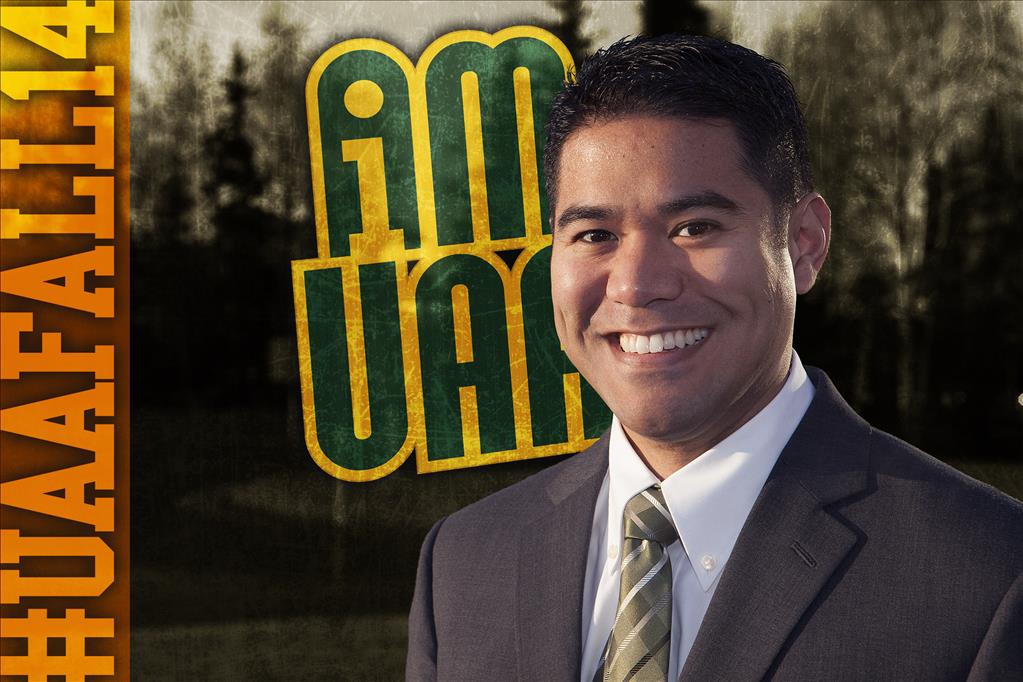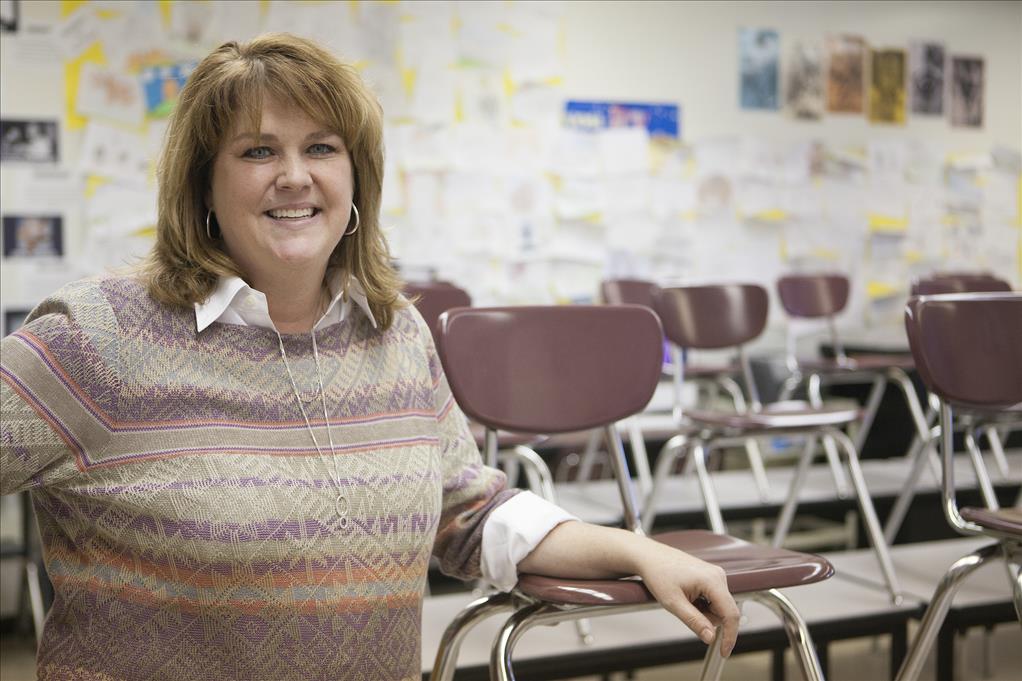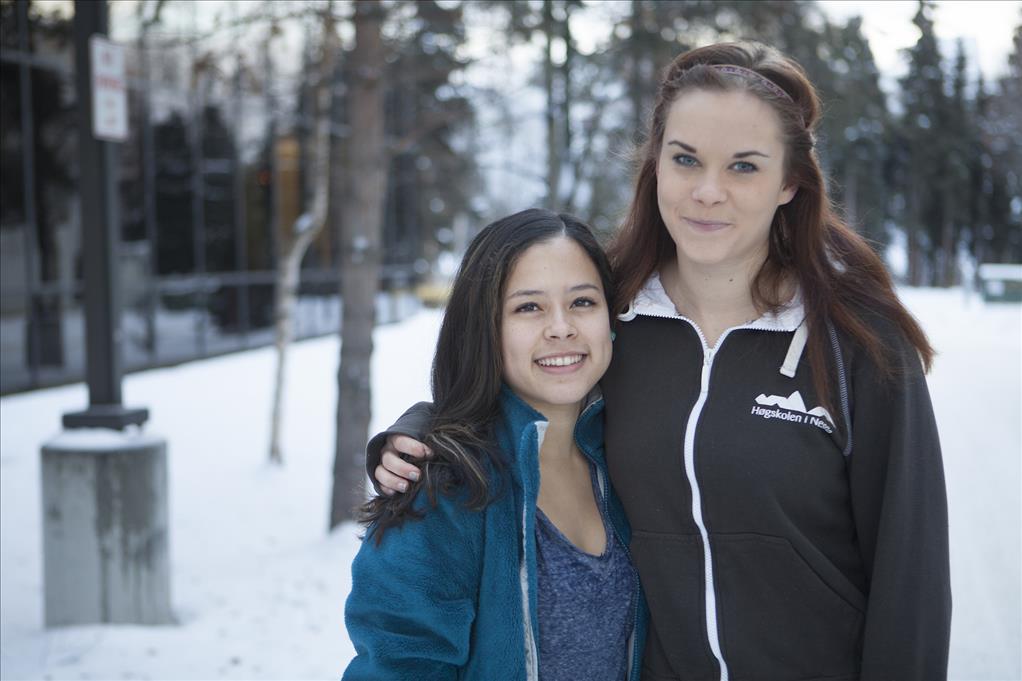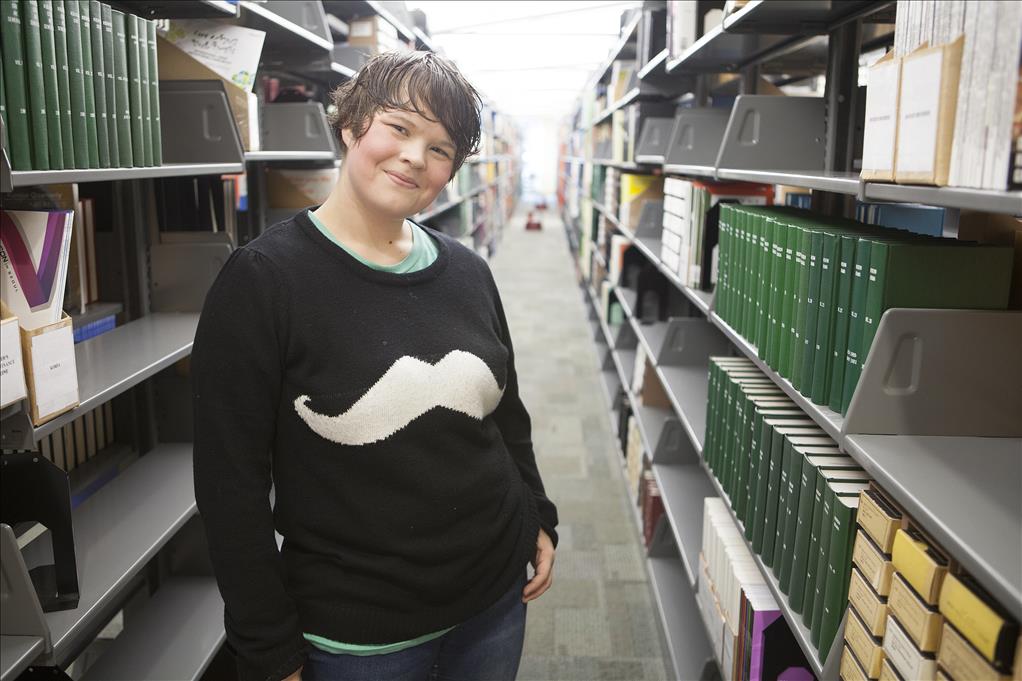Students bring Iceland to Anchorage
by joey |
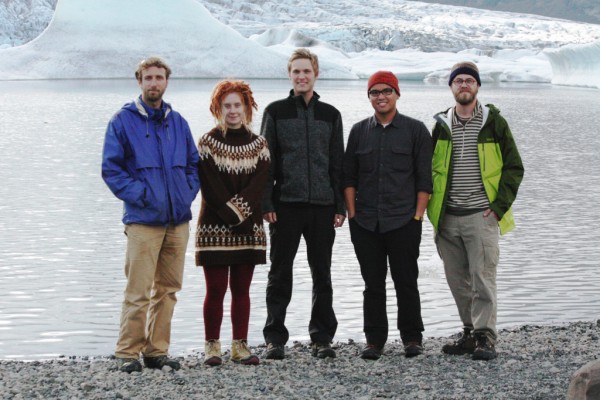
UAA's Nordik Langauge Klub meets twice a week to practice and discuss Icelandic and Norwegian. In July 2014, several club members headed to Iceland to test out their Icelandic language skills. (Photo courtesy of Nordik Language Klub)
The wall-sized whiteboards in the ConocoPhillips Integrated Science Building (CPISB) are riddled with chemical diagrams and physics equations. But tucked in the corner, there's a wall of scribbles as equally foreign as the eðlisfræði (physics) and líffræði (biology) notes. It's Icelandic, and it's impressive.
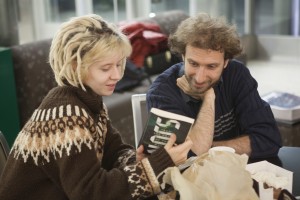
Alyx Shroy (left) and Arkadi Futerman, founders of Nordik Langauge Klub. (Photo by Philip Hall/University of Alaska Anchorage)
Every Thursday evening, Nordik Language Klub-an intrepid batch of language enthusiasts-posts up by the piano in CPISB with worksheets, dry erase markers and (occasionally) cupcakes. The group started when just two students-Alyx Shroy and Arkadi Futerman-decided to practice Icelandic together at a local bookstore. In the past year, though, they've moved on campus, become an official club, expanded to Norwegian nights, hosted cultural events, met the Icelandic ambassador to the U.S. and even traveled to Iceland.
The heart of the club, though, is still learning Icelandic, and weekly meetings draw a rotating crew of students, alumni and Anchorage neighbors to sit around and talk shop about the birthplace of Björk.
Læratungumál (learning the language)
Icelandic, it turns out, is extremely complex.
Through centuries of island isolation, Icelanders have managed to preserve their language largely unchanged. A time-traveling 5-year-old from the present-day could end up in the 13th century and still ask for directions. English speakers, for comparison, struggle with Shakespeare (early modern English), slog through Canterbury Tales (middle English) and let's not even address Beowulf (Old English and, on that note, closer to modern Icelandic than it is to modern English).
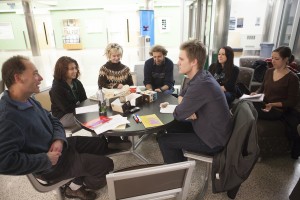
Members of Nordik Language Klub hone their Icelandic skills every Thursday at 7 p.m. in CPISB. Club meetings are open to the public. (Photo by Philip Hall/University of Alaska Anchorage)
Even in today's interconnected world, Iceland has remained staunchly isolationist with their language. "The Icelanders have a policy where they don't borrow any words. They make their own word for everything," noted Ken Baitsholts, an Anchorage resident and Icelandic literature enthusiast who once lived 14 months on an Icelandic farm.
When Icelandic requires a new word, they have a government-sponsored cultural board specifically tasked with making one up. While English borrows words from everywhere (raccoon from Algonquin, safari from Swahili, even geyser from Icelandic) the Icelanders dig deep into their roots and craft new words from ancient roots. For example, when the telephone debuted, variations of the Greek word for "far voice" popped up across the map-everyone from Turkish (telefon) to Haitian Creole (telefòn) to Somali (telefoonka) got on board. Iceland, though, went with sími, an ancient word for 'long thread.'
"Icelandic is also extremely difficult," noted Ken. Words pile on prefixes and endings, and declensions and inflections are plentiful. While English-speakers use the same word-two-to refer to any pair, Icelanders have a different pronunciation dependent on whether the pair is male or female, where the word falls in the sentence, etc. Even Icelanders names can be pronounced differently based on whether they're the object or subject. The country even hosts an Icelandic Naming Committee to decide what names are acceptable for citizens, based partly on whether they'll fit with preexisting syntax rules.
"When we first started, it was kind of a puzzle. The information is out there in little pieces and chunks, but there is no definitive textbook approach," Arkadi explained. "So we kind of scoured the Internet to understand what was going on-like, why is this word so long?"
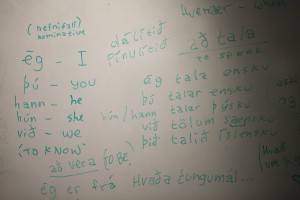
Each week, members add more Icelandic grammar and vocabulary to the wall-sized white boards in CPISB. (Photo by Philip Hall/University of Alaska Anchorage)
"We were trying to learn some grammar and we were finding how complicated it was," Alyx added. "You have to know the gender of all the words, and all of the parts of the sentence ... It's really cool but it's kind of oppressive sometimes."
The challenges, though, are part of the appeal for these language lovers. "I think you already have to be crazy about language to start learning Icelandic," Alyx laughed.
To fully understand the intricacies of Icelandic, it's just best to visit the club. Their laidback curiosity makes every meeting welcoming, and their energy and friendliness is as warm as a new Icelandic sweater. "We just go over the basics-these are the extra weird letters, this is how you introduce yourself-things like that," Alyx said of their first steps.
"It's a really good group of people," she added. "Everyone here is completely unique and just really interesting.
Language nights
Nordik Language Klub currently meet from 7-8 p.m. in CPISB, Wednesdays for Norwegian and Thursdays for Icelandic. The evening hours are intentional, as the club is open to the whole city. They're always eager to meet new members, and it's strictly for fun and for practice.
"Every week it changes a little bit," Alyx said of the weekly meetings. Some days they watch Icelandic-captioned skits, other nights they just talk about favorite words. For the past several Wednesdays, they've been group-reading "Chronicles of Narnia" in Norwegian. One night they attempted to sing Icelandic hymns. "We kind of jump between grammar lessons in the textbook to readings to exercises where we'll read through dialogues and practice," she said. "We bring handouts and some children's books-which are already way way over our heads-but it's fun."
Textbooks, it turns out, are incredibly difficult to locate. "There are only 340,000 people [in Iceland], which is why it's so hard to get materials," Ken explained.
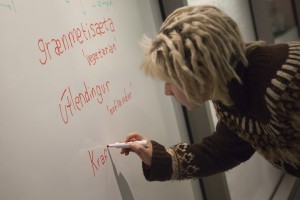
Alyx Shroy, president of Nordik Language Klub, adds a few Icelandic vocabulary words to the whiteboards in ConocoPhillips Integrated Science Building. (Photo by Philip Hall/University of Alaska Anchorage)
"Basically every Icelandic book is a rare book. Publishing is already nearly a losing proposition," he continued. "That's why it's admirable how much [Arkadi and Alyx] have done on their own without any guidance at all."
The club's website lists dozens of worksheets and texts added by Arkadi and Alyx in their tenacious online research. Likewise, they maintain an active Facebook page that's attracted a small international cadre, including a popular Icelandic musician. "We post a question on the Facebook page and we could have not heard from him in months, but he'll show up out of nowhere and respond to it," Alyx said. "It's incredible. "
Icelanders and ambassadors
Thankfully, the group has a solid Icelandic resource much closer to home.
Sometimes, the group will settle into their spot in CPISB and discover their whiteboard scribbles have been edited. "Occasionally we'll write stuff on the board and then come back the next week and it's got corrections," smiled Alyx. "We never see when it happens, but it just happens." It's almost as though their work is secretly revised by the invisible elves roughly half of Icelanders believe in today.
In fact, it's a little easier to explain. The grammar phantom is actually native Icelander Bjartmar Sveinbjörnsson, professor of biological sciences at UAA, who teaches in the same building. He's not the only Icelander on campus-his daughter Anna works across the parking lot at the UAA/APU Consortium Library.
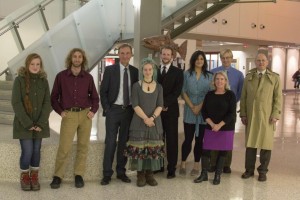
Earlier this year, club members received a rare visit from Iceland's ambassador to the United States, Guðmundur Árni Stefánsson (third from left). (Photo courtesy of Nordik Language Klub)
In addition to teaching, Bjartmar is acting consul for the region and takes on official Icelandic business as needed. Arkadi first contacted Bjartmar after a random search for Icelandic embassies revealed an honorary consul was mere steps away. "I realized we have one on campus, go figure," he joked. Bjartmar has since loaned several Icelandic texts to the club and even, incredibly, set up a visit from the Icelandic ambassador.
"We are very fortunate," Arkadi said of the support and assistance from both Bjartmar and Anna. "They've been very helpful with how busy they are. They're always very flexible if we need anything [like] proofreading or recommendations."
Passport stamps
This July, five students headed out on a Nordic vacation to soak in geothermal pools, try on excellent wool sweaters and put their Icelandic skills to the test. Thanks to Icelandair's seasonal service, Anchorage is a remarkable six-hour flight from Reykjavik, making Iceland's capital a quicker trip than flying to Chicago.
Their language skills were passable at best. The experience, though, was all-around excellent.
"It was incredibly rudimentary," Arkadi noted, recalling a conversation he initiated near the end of the trip. "The lady responded in Icelandic, very fast, and I was so proud," he noted. "And of course I had to say, "Hey, I don't actually know what you're saying," [but] she said I sounded very good."
"I was happy when I knew the guy was asking if I wanted my receipt," Alyx laughed.
The club may return to Iceland again. For now, though, they'll spend the long winter beneath the changing colored lights of the CPISB, covering the whiteboards in Icelandic and honing their skills for future voyages to our neighbors in the North.
Nordik Language Klub meets twice weekly at 7 p.m. in CPISB. Norwegian night is Wednesdays, Icelandic is Thursdays. For more information, visit their website or follow them on Facebook.
To hear Icelandic in action, listen to the livestream from RUV-the Icelandic equivalent to NPR-at http://www.ruv.is/ras2
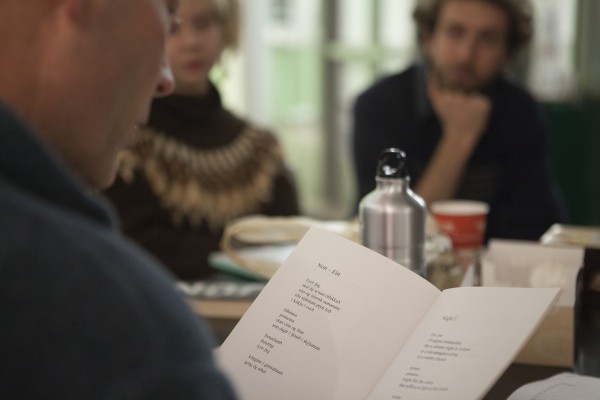
Ken Baitsholts reads an Icelandic poem at a recent meeting of Nordik Language Klub. (Photo by Philip Hall/University of Alaska Anchorage)
Written by J. Besl, UAA Office of University Advancement
 "Students bring Iceland to Anchorage" is licensed under a Creative Commons Attribution-NonCommercial 4.0 International License.
"Students bring Iceland to Anchorage" is licensed under a Creative Commons Attribution-NonCommercial 4.0 International License.










